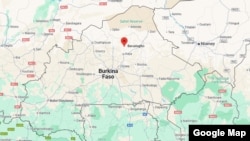Families of Burkina Faso civilians killed in a massacre have accused the army of exposing them to their militant killers by making them leave their village to dig a trench.
Armed men carried out the attack in the village of Barsalogho in north central Burkina Faso on Saturday, killing dozens of civilians and security personnel, local sources said.
A group linked to al-Qaeda, known by its Arabic initials JNIM, claimed responsibility and said it had seized control of a local militia headquarters.
A group representing victims' families, the Justice Collective for Barsalogho, said in a statement seen by Agence France-Presse on Tuesday that Burkina Faso military officials had "obliged people, through threats, to take part in construction work, against their will."
It said they forced the locals to dig a trench 3 kilometers (1.86 miles) from the village for forces to use in fighting off the militants.
The collective demanded that investigations be carried out to determine who was responsible for the alleged order.
In two videos apparently documenting the massacre —circulated on social media and attributed by various sources to JNIM — assailants in military dress are seen firing automatic weapons at a trench containing at least 91 bodies.
Authorities have not given a toll.
A member of the collective, who asked not to be named for fear of reprisals by the army, told AFP they helped bury victims in mass graves that contained "more than 100 bodies."
Rebels affiliated with al-Qaeda and the Islamic State group have waged an insurgency in Burkina Faso since 2015 that has killed more than 20,000 people, according to the Armed Conflict Location and Event Data Project.
A security source earlier claimed that "the response of the soldiers" and auxiliary troops "made it possible to neutralize several terrorists and avoid a greater tragedy."
After taking power in a coup in September 2022, Burkina's junta leader Ibrahim Traore vowed to make fighting terrorism a priority.
This year he issued a call to civil auxiliary fighters who are aiding the army to "mobilize local people to dig trenches to protect yourselves" until machinery could be delivered.




